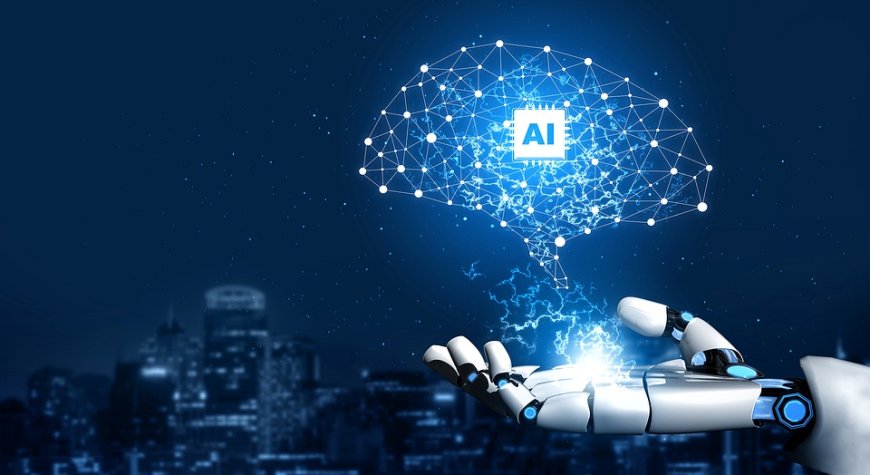Top 10 AI Business Ideas to Revolutionize Industries In 2024
Here, we'll explore the top 10 AI business ideas that are set to reshape various industries by the year 2024. So fasten your seatbelts as we embark on a journey into the exciting realm of AI-powered innovation.

Introduction to AI and its potential in business
Welcome to the future of business! The world of artificial intelligence (AI) is rapidly evolving, and its potential to revolutionize industries is simply astonishing. From improving customer service to streamlining supply chain management, AI has become an indispensable tool for businesses seeking growth and efficiency.
Top 10 AI Business Ideas to Revolutionize Industries
Get ready to be inspired by these game-changing ideas that will shape the landscape of business in the coming years. Let's dive right in!
The importance of implementing AI in industries for growth and efficiency
Industries around the world are constantly seeking ways to enhance growth and efficiency. In this pursuit, the implementation of artificial intelligence (AI) has emerged as a game-changer. AI brings forth a multitude of benefits that can revolutionize businesses in various sectors.
One key advantage of implementing AI in industries is its ability to automate mundane and repetitive tasks. This allows employees to focus on more creative and strategic aspects of their work, leading to increased productivity and efficiency. With AI taking care of routine operations, companies can save time, reduce costs, and allocate resources more effectively.
Another crucial aspect is the power of data analysis that AI brings to the table. By processing vast amounts of information at lightning speed, AI algorithms can uncover valuable insights that were previously hidden or difficult for humans to detect. These insights enable businesses to make data-driven decisions with precision and accuracy.
Furthermore, AI enhances customer experiences by providing personalized interactions and recommendations based on individual preferences and behavior patterns. From chatbots offering instant support on e-commerce websites to virtual assistants guiding customers through complex buying processes, AI-powered customer service improves satisfaction levels while reducing response times.
In addition to these advantages, implementing AI in industries also contributes towards improved safety measures. For instance, predictive maintenance using machine learning algorithms helps identify potential equipment failures before they occur, preventing costly breakdowns or accidents in manufacturing facilities.
The integration of augmented reality (AR) technology with interior design services is another exciting area where AI-driven solutions have tremendous potential. Virtual interior design tools empower customers by allowing them to visualize furniture placement or color schemes before making purchases – saving both time and money for all parties involved.
From healthcare diagnostics based on medical image analysis using deep learning algorithms to automated fraud detection systems in banking sector - there are countless applications where AI can revolutionize existing practices across different industries.
1. Chatbot customer service for e-commerce
Chatbot customer service for e-commerce has become a game-changer in the industry. With AI-powered chatbots, businesses can provide efficient and personalized customer support 24/7 without the need for human intervention. These virtual assistants are capable of understanding and responding to customer queries in real-time.
One of the key benefits of using chatbots is their ability to handle multiple conversations simultaneously, ensuring that no customer is left waiting for a response. This not only improves customer satisfaction but also reduces operational costs by eliminating the need for a large customer support team.
Moreover, chatbots can analyze data from previous interactions with customers to provide personalized recommendations and suggestions. By leveraging machine learning algorithms, these AI-powered assistants can understand user preferences and behavior patterns, allowing them to offer tailored product recommendations or suggest relevant upsells.
In addition, implementing chatbot customer service allows businesses to gather valuable insights about their customers' needs and expectations. Through analyzing conversation data, companies can identify trends and make informed decisions regarding product development, marketing strategies, and overall business growth.
Integrating AI-powered chatbot technology into e-commerce platforms brings numerous advantages such as improved efficiency in handling customer inquiries, enhanced personalization capabilities,and valuable data insights that drive business growth. As we move towards an increasingly digital future,the implementation of this innovative solution will undoubtedly revolutionize the way businesses engage with their customers online.
2. AI-powered supply chain management
AI-powered supply chain management has become a game-changer in the world of business. With its ability to analyze vast amounts of data and make accurate predictions, AI is revolutionizing how companies manage their supply chains.
One key benefit of using AI in supply chain management is improved forecasting. Traditional methods rely on historical data and human intuition, which can be prone to errors. However, AI algorithms can take into account various factors such as market trends, customer behavior, and even weather patterns to provide more accurate demand forecasts.
Another way AI is transforming supply chain management is through optimization. By utilizing machine learning algorithms, businesses can optimize their inventory levels, transportation routes, and production schedules. This not only reduces costs but also improves efficiency by minimizing waste and maximizing resource utilization.
Furthermore, AI enables real-time visibility throughout the entire supply chain. With sensors and IoT devices connected to an AI system, companies can track the movement of goods from suppliers to customers in real-time. This allows for better coordination among different stakeholders and faster response times when issues arise.
Additionally, AI-powered supply chain management enhances risk management capabilities. By analyzing historical data and monitoring current events globally, AI systems can identify potential disruptions or bottlenecks in the supply chain before they occur. This proactive approach helps businesses mitigate risks and maintain continuity in operations.
In conclusion (not conclusive), implementing AI in supply chain management offers numerous benefits that lead to increased efficiency and cost savings for businesses across industries. From forecasting demand accurately to optimizing resources effectively, leveraging AI technology positions companies at a competitive advantage in today's fast-paced global marketplace.
3. Predictive maintenance for manufacturing companies
Predictive maintenance is revolutionizing the way manufacturing companies operate. By utilizing artificial intelligence, these companies can now predict potential equipment failures and perform necessary maintenance tasks before a breakdown occurs.
With AI-powered predictive maintenance systems in place, manufacturers can gather real-time data from sensors embedded in their machinery. This data is then analyzed using advanced algorithms that can detect patterns and anomalies. By monitoring factors such as temperature, vibration, and energy consumption, the system can identify signs of deterioration or malfunctioning components.
The benefits of implementing predictive maintenance are immense. It helps reduce unplanned downtime significantly. Instead of waiting for a machine to fail and then fixing it, manufacturers can proactively address issues before they escalate into major problems. This leads to increased operational efficiency and productivity.
Additionally, predictive maintenance optimizes the use of resources by enabling manufacturers to schedule repairs or replacements only when necessary. It eliminates unnecessary preventive maintenance activities that may disrupt production unnecessarily or result in wasted time and money.
Moreover, with AI-driven insights on equipment performance trends over time, manufacturers gain valuable knowledge about potential design flaws or weaknesses within their machines. This information allows them to make informed decisions regarding product improvement or redesigns for future iterations.
In conclusion (not conclusive), predictive maintenance powered by AI technology has tremendous potential for manufacturing companies. By leveraging this innovation, businesses can minimize downtime costs while maximizing overall efficiency and productivity levels throughout their operations.
4. Virtual interior design services using AR technology
Virtual interior design services using AR technology have the potential to revolutionize the way we decorate our homes. With augmented reality, homeowners can now visualize how different furniture and decor items will look in their space before making any purchases. This not only saves time but also eliminates the risk of buying something that doesn't fit or match with the overall aesthetic.
By simply using their smartphones or tablets, users can access virtual catalogs and place 3D models of furniture and accessories within their rooms. They can experiment with various layouts, colors, and styles to find the perfect combination that suits their taste. This level of customization empowers individuals to create spaces that truly reflect their personality and lifestyle.
Moreover, virtual interior design services offer a cost-effective solution for both designers and clients. Designers can showcase their work without physically setting up showrooms, while clients can enjoy professional guidance without leaving the comfort of their homes.
With AR technology constantly evolving, it's exciting to imagine what future advancements could bring to this industry. From interactive room tours to real-time collaboration between designers and clients, the possibilities are endless when it comes to creating immersive virtual experiences for interior design enthusiasts around the world.
5. Personalized healthcare through AI analysis of medical data
Personalized healthcare is a rapidly growing field, with AI playing a crucial role in revolutionizing the way medical data is analyzed and utilized. By harnessing the power of machine learning algorithms, AI can assist in diagnosing diseases, predicting patient outcomes, and recommending personalized treatment plans.
One of the key benefits of AI in healthcare is its ability to analyze vast amounts of medical data quickly and accurately. From electronic health records to genetic profiles, AI can process this information to identify patterns and trends that may not be immediately apparent to human clinicians. This enables healthcare providers to make more informed decisions about patient care.
AI-powered systems can also help improve patient outcomes by providing personalized treatment recommendations. By analyzing a patient's individual characteristics such as their genetics, medical history, lifestyle factors, and response to previous treatments, AI algorithms can suggest tailored interventions that are more likely to be effective for that particular individual.
Furthermore, AI has the potential to enhance preventive medicine efforts by identifying individuals who are at high risk for certain conditions. By analyzing large datasets and considering various risk factors, such as age, family history, lifestyle choices etc., AI algorithms can help prioritize screenings or preventative measures for those who need them most.
However it important must keep in mind that while there are great promises associated with applying artificial intelligence technologies into healthcare industry there remain significant challenges related privacy concerns regarding sensitive medical data usage that needs addressing before widespread adoption becomes possible.
6. Automated fraud detection in banking and finance industry
The banking and finance industry has always been vulnerable to fraud, posing significant risks to both financial institutions and their customers. However, with the advancements in artificial intelligence (AI), automated fraud detection systems are revolutionizing the way these industries combat fraudulent activities.
AI-powered fraud detection algorithms can analyze vast amounts of data, detecting patterns and anomalies that may indicate fraudulent behavior. By utilizing machine learning techniques, these systems continuously learn from new data, improving accuracy over time.
One of the key advantages of automated fraud detection is its ability to detect suspicious transactions in real-time. Traditional manual methods often rely on post-transaction analysis, which can be time-consuming and ineffective when dealing with sophisticated criminals.
Moreover, AI-based systems can also adapt to evolving fraud trends by identifying emerging patterns or indicators of potential threats. This proactive approach allows banks and financial institutions to stay one step ahead of fraudsters.
Additionally, automated solutions significantly reduce false alarms by accurately distinguishing between legitimate transactions and actual fraudulent activity. This not only saves resources but also improves customer satisfaction by minimizing unnecessary disruptions for genuine customers.
Implementing automated fraud detection systems is a win-win situation for both businesses and consumers alike. Financial institutions benefit from improved security measures while providing peace of mind for their customers who can trust that their assets are protected from unauthorized access or manipulation.
AI-powered automated fraud detection is reshaping the banking and finance industry's fight against fraudulent activities. By leveraging advanced technologies such as machine learning and real-time analytics, businesses can strengthen their defenses against ever-evolving threats in today's digital landscape without compromising efficiency or customer experience.
7. Smart farming using drones and machine learning algorithms
Smart farming, a revolutionary concept that combines drones and machine learning algorithms, has the potential to transform the agriculture industry. By harnessing the power of artificial intelligence, farmers can now monitor their crops with greater precision and efficiency.
Drones equipped with cameras and sensors can capture aerial images of farmland, providing valuable insights into plant health and growth patterns. With advanced machine learning algorithms, these images can be analyzed in real-time to detect any signs of disease or nutrient deficiencies. This allows farmers to take proactive measures and address issues before they escalate.
Moreover, smart farming enables precise irrigation systems by analyzing soil moisture levels and weather conditions. By optimizing water usage based on data-driven recommendations, farmers can conserve resources while ensuring optimal crop growth.
In addition to monitoring crops, drones are also being used for precision spraying of fertilizers and pesticides. Machine learning algorithms help identify areas that require treatment based on visual cues from drone imagery analysis. This targeted approach reduces chemical usage and minimizes environmental impact.
Furthermore, AI-powered analytics platforms provide comprehensive farm management solutions by integrating data from multiple sources such as weather forecasts, soil samples, crop yield records, and market trends. These platforms enable farmers to make informed decisions regarding planting schedules, crop rotation strategies, pricing strategies etc., maximizing productivity and profitability.
The potential applications of smart farming are vast – from optimizing livestock management through facial recognition technology to automating harvesting processes using robotic arms guided by computer vision algorithms. The possibilities are endless!
With advancements in AI technologies continuing at an exponential pace,the future holds great promise for smart farming revolutionizing agriculture across the globe!
8. Build AI Based Matrimony App
In today's digital age, finding a life partner has become easier than ever before. With the advancements in artificial intelligence (AI), there is immense potential to revolutionize the way people search for their soulmates. One such innovative idea is building an AI-based matrimony app.
Imagine a platform that uses AI algorithms to match individuals based on compatibility factors such as personality traits, interests, and values. Gone are the days of sifting through countless profiles and trying to find common ground with someone. With an AI-powered matrimony app, users can be confident that they will be connected with like-minded individuals who share similar goals and aspirations.
Not only does this save time and effort for users, but it also enhances the overall matchmaking experience. The app can provide personalized recommendations by analyzing user preferences and behavior patterns. This means that each profile suggested will have a higher likelihood of being a compatible match.
Moreover, an AI-based matrimony app can offer additional features like facial recognition technology for enhanced security measures or real-time chatbots for instant communication between matched individuals.
By leveraging AI technology in the field of matrimonial services, we can create a more efficient and effective way for people to find their life partners. It opens up new possibilities for creating meaningful connections that are rooted in shared values and aspirations.
With so many technological advancements happening around us every day, it's exciting to think about how AI can transform industries like matrimony. By embracing these innovations, we have the power to shape our future in ways we never thought possible!
9. Build AI Based Real Estate App
The real estate industry is ripe for disruption, and AI-powered technology can be a game-changer. Imagine being able to search for your dream home with just a few clicks, thanks to an AI-based real estate app that understands your preferences and needs.
With an AI-based real estate app, you can say goodbye to hours of searching through countless listings. The app uses machine learning algorithms to analyze your past searches and interactions, as well as data from other users, to provide personalized recommendations tailored specifically to you.
Not only does this save you time and effort, but it also increases the chances of finding the perfect property that meets all your criteria. Whether you're looking for a spacious backyard or a modern kitchen, the AI-powered app will narrow down the options based on your preferences.
Moreover, an AI-based real estate app can also help streamline the buying process. From mortgage calculators to virtual tours of properties, these apps offer innovative features that simplify every step of purchasing a home.
Additionally, these apps can provide valuable insights into market trends and pricing analysis. By leveraging big data and predictive analytics capabilities, they can predict future property values with a high degree of accuracy. This information empowers both buyers and sellers in making informed decisions about their investments.
Building an AI-based real estate app has tremendous potential in revolutionizing the way people buy and sell properties. With its ability to personalize recommendations based on individual preferences and simplify complex processes involved in real estate transactions, such an app promises efficiency and convenience like never before!
10. Build AI Based Talent Acquisition Software
In today's fast-paced and competitive business landscape, staying ahead of the curve is crucial for success. And one way to achieve this is by leveraging the power of AI. From customer service to supply chain management, AI has the potential to revolutionize industries in ways we never thought possible.
One such area where AI can make a significant impact is talent acquisition. Hiring the right people for your organization can be a challenging task, but with an AI-based talent acquisition software, it becomes much more streamlined and efficient.
Imagine being able to analyze large volumes of resumes and job applications in seconds, saving you valuable time and effort. An AI-powered talent acquisition software can do just that. It uses advanced algorithms to scan resumes for keywords and qualifications, match candidates with job requirements, and even predict their future performance based on past data.
Not only does this save HR professionals countless hours of manual screening, but it also ensures that only the most qualified candidates are shortlisted for further consideration. This not only increases efficiency but also improves the chances of finding the perfect fit for your organization.
Furthermore, an AI-based talent acquisition software can also help reduce bias in hiring decisions. By removing human biases from the equation and focusing solely on objective criteria, organizations can ensure fairer hiring practices and promote diversity within their workforce.
Additionally, these systems often come equipped with features like automated interview scheduling and candidate communication tools. This streamlines the entire recruitment process from start to finish while providing a seamless experience for both recruiters and applicants.
As we look towards 2024 and beyond, it's clear that embracing artificial intelligence will become increasingly essential for businesses looking to thrive in their respective industries. The possibilities are endless when it comes to harnessing AI's potential – from improving customer service using chatbots to optimizing supply chains through predictive maintenance.
So whether you're running an e-commerce store or managing a manufacturing company, incorporating AI into your business strategy should be at the top of your priority list. The future is here, and AI is ready to revolutionize the way we work and do business.











.jpg)


































